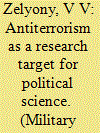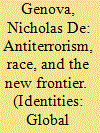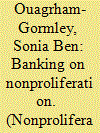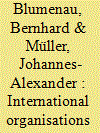|
|
|
Sort Order |
|
|
|
Items / Page
|
|
|
|
|
|
|
| Srl | Item |
| 1 |
ID:
149021


|
|
|
|
|
| Summary/Abstract |
The paper offers a traditional view of antiterrorism and the author's interpretation of the notion, as well as the poltical manifestations and levels of antiterrorism.
|
|
|
|
|
|
|
|
|
|
|
|
|
|
|
|
| 2 |
ID:
062254


|
|
|
|
|
| Publication |
Jul-Aug 2005.
|
| Summary/Abstract |
This article examines key provisions of Australia's antiterrorism legislation introduced in the aftermath of the 11 September attacks. Never before in history has Australia witnessed a comparable overhaul of national security legislation and the introduction of laws that significantly curtail civil liberties and fundamental freedoms. A question that thus needs to be addressed is whether or not Canberra's drastic legislative measures are justified by the severity of the terrorism threat to Australia. It is argued that the actual risk of a terrorism attack occurring on Australian soil is rather low. As a consequence, the Howard government's antiterrorism laws constitute a disproportionate response that has worrisome long-term implications for Australia's legal system and its society more generally.
|
|
|
|
|
|
|
|
|
|
|
|
|
|
|
|
| 3 |
ID:
101283


|
|
|
|
|
| Publication |
2010.
|
| Summary/Abstract |
Following Barack Obama's election as United States president, the illusion that the worst excesses of the Bush administration are now simply finished must be tempered by a sober assessment of the deeply consequential institutionalization of antiterrorism as the intransigent idiom of a new species of security state formation. Obama's assumption of responsibility for the conduct of the so-called War on Terror has committed him to the dominant ethos of antiterrorism and a multifaceted program of securitization, "domestically" and internationally. Furthermore, the task of reinvigorating United States nationalism by exalting American exceptionalism is one that deeply conjoins Obama with his predecessor. This is, perhaps, nowhere so evident as in Obama's dissimulations of the racial singularity and salience of his accession to the presidency. Indeed, he compulsively deracialized his election in favor of an American exceptionalist gesture of patriotic postracialism. This essay interrogates the relation between this "postracial" Americanism and a distinctly imperial multiculturalism. Through this "postracial" and assimilationist vision of empire, and by means of the crucial (racially ambiguous) figure of the Muslim, the United States has fashioned itself as the decisive police power of an incipient Global Security State, charged with putting in order the wild new frontiers of an unruly planet.
|
|
|
|
|
|
|
|
|
|
|
|
|
|
|
|
| 4 |
ID:
114436


|
|
|
|
|
| Publication |
2012.
|
| Summary/Abstract |
In the past decade, governments have increasingly relied on financial sanctions to counter the proliferation of weapons of mass destruction. By targeting not only individuals and entities involved in illicit activities, but also banks that allow transactions to occur, financial sanctions were expected to stanch the flow of funds that support proliferation and compel compliance with international law-notably by Iran. Ten years later, Iran's nuclear program has advanced, calling into question the effectiveness of financial sanctions. Previous research evaluating the effectiveness of financial sanctions has focused on the impact of sanctions on the targeted country or on the enforcement of sanctions by the international community. Little attention has been devoted to their implementation by banks and government agencies. Based on interviews with US and European bank and government representatives, this article argues that the inefficiency of financial sanctions is due to shortcomings in training and information support from governments to financial institutions; governments on both sides of the Atlantic have provided little or no assistance to enable banks to identify patterns of proliferation financing and implement the sanctions regime. To transform financial sanctions into effective nonproliferation tools, governments need to play a greater role in their implementation.
|
|
|
|
|
|
|
|
|
|
|
|
|
|
|
|
| 5 |
ID:
132183


|
|
|
|
|
| Publication |
2014.
|
| Summary/Abstract |
This article looks at the European Communities' efforts against terrorism in the 1970s. It argues that in spite of the high ambitions to improve European legal integration, the attempts to develop an antiterrorism agreement were quite obviously a failure. Although the Dublin Agreement was adopted in 1979 after cumbersome and lengthy negotiations, it fell short of showing the member states' unity and resolve to fight terrorism, and it never entered into force. The tedious negotiations drained the member states' energy and willingness to such an extent that no other steps toward judicial integration or antiterrorism treaties were taken.
|
|
|
|
|
|
|
|
|
|
|
|
|
|
|
|
| 6 |
ID:
190974


|
|
|
|
|
| Summary/Abstract |
This article examines early antiterrorism negotiations within international organisations (IOs) and their outcomes. It assesses how international cooperation emerged in specialised, regional, and global IOs and provides a long-term overview from the 1960s until the late 1980s. Drawing on primary sources and scholarly literature, this article identifies the patterns, trends, and key characteristics of the successfully adopted measures. It demonstrates that early multilateral antiterrorism efforts faced several obstacles (sovereignty, national interests, mistrust, and geopolitics), and, therefore, international negotiations fared better when following a piecemeal approach within specialised or regional organisations, where the focus could be on specific aspects of terrorism (e.g., hostage-takings). A key characteristic of the successfully adopted antiterrorism instruments was the aut dedere aut iudicare principle, which allowed states to maintain perceptions of sovereignty by either extraditing or trying a suspect. The antiterrorism efforts examined here were mostly preventative in design and worked to discourage future terrorists by ensuring that safe havens were closed and that perpetrators faced justice. The shift to suicide terrorism in the 1990s would instead require new international antiterrorism efforts to focus on pre-emptive strategies, depriving terrorists of the means to carry out attacks. The roots of these measures were laid in the 1980s.
|
|
|
|
|
|
|
|
|
|
|
|
|
|
|
|
| 7 |
ID:
053900


|
|
|
|
|
|
|
|